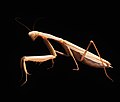| Mantis | |
|---|---|
 | |
| Scientific classification | |
| Kingdom: | Animalia |
| Phylum: | Arthropoda |
| Class: | Insecta |
| Order: | Mantodea |
| Family: | Mantidae |
| Tribe: | Mantini |
| Genus: | Mantis Linnaeus, 1758 |
| Species | |
| Synonyms | |
| |
The genus Mantis is in the family Mantidae, of the mantis order Mantodea. Members of this genus can be found in Asia, Africa, Australia, and recently one species has been introduced to North America.
Contents
Some of its species have the common name "praying mantis".




